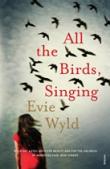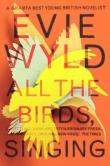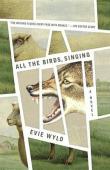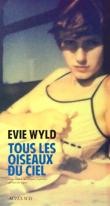AustLit
Latest Issues
AbstractHistoryArchive Description
'Who or what is watching Jake Whyte from the woods?
'Jake Whyte is the sole resident of an old farmhouse on an unnamed island, a place of ceaseless rains and battering winds. It's just her, her untamed companion, Dog, and a flock of sheep. Which is how she wanted it to be. But something is coming for the sheep - every few nights it picks one off, leaves it in rags.
'It could be anything. There are foxes in the woods, a strange boy and a strange man, rumours of an obscure, formidable beast. And there is Jake's unknown past, perhaps breaking into the present, a story hidden thousands of miles away and years ago, in a landscape of different colour and sound, a story held in the scars that stripe her back.
'Set between Australia and a remote English island, All the Birds, Singing is the story of one how one woman's present comes from a terrible past. It is the second novel from the award-winning author of After the Fire, A Still Small Voice.' (Publisher's blurb)
Publication Details of Only Known VersionEarliest 2 Known Versions of
Other Formats
- Sound recording.
- Large print.
- Braille.
Works about this Work
-
(Post-) Pastoral
2020
single work
criticism
— Appears in: Packing Death in Australian Literature : Ecocides and Eco-Sides 2020; (p. 44-66) -
y
 Packing Death in Australian Literature : Ecocides and Eco-Sides
London
:
Routledge
,
2020
19932417
2020
multi chapter work
criticism
Packing Death in Australian Literature : Ecocides and Eco-Sides
London
:
Routledge
,
2020
19932417
2020
multi chapter work
criticism
'Packing Death in Australian Literature: Ecocides and Eco-Sides addresses Australian Literature from ecocritical, animal studies, plant studies, indigenous studies, and posthumanist critical perspectives. The book’s main purpose is twofold: to bring more sustained attention to environmental, vegetal, and animal rights issues, past and present, and to do that from within the discipline of literary studies. Literary studies in Australia continue to reflect disinterest or not enough interest in critical engagements with the subjects of Australia’s oldest extant environments and other beings beside humans.
'Packing Death in Australian Literature: Ecocides and Eco-Sides foregrounds the vegetal and nonhuman animal populations and contours of Australian Literature. Critical studies relied on in Packing Death in Australian Literature: Ecocides and Eco-Sides include books by Simon C. Estok, Bill Gammage, Timothy Morton, Bruce Pascoe, Val Plumwood, Kate Rigby, John Ryan, Wendy Wheeler, Cary Wolfe, and Robert Zeller. The selected literary texts include work by Merlinda Bobis, Eric Yoshiaki Dando, Nugi Garimara, Francesca Rendle-Short, Patrick White, and Evie Wyld.'
Source: Publisher's blurb.
-
Relational Ethics : Writing about Birds; Writing about Humans
2019
single work
criticism
— Appears in: TEXT Special Issue Website Series , October no. 57 2019; 'Philip Armstrong points out that scholars in Animal Studies are ‘interested in attending not just to what animals mean to humans, but what they mean to themselves; that is, to the ways in which animals might have significances, intentions and effects quite beyond the designs of human beings’ (2008: 2). This essay asks: what are the ethics of representing birds in fiction? It promotes the model offered by Linda Alcoff in ‘The Problem of Speaking for Others’ (1992). Alcoff offers a set of ‘interrogatory practices’ for writers, including an analysis of our speaking position to expose any implicit discourses of domination at work, and, most importantly, a consideration for the effects of ‘speaking for’ on actual animals. Using Alcoff’s interrogatory practices as a framework, I examine the ways writers have allowed for ‘ethical relationships’ between humans and birds in fictional spaces. I investigate the function of birds as metaphor in three Australian novels: Alexis Wright’s The Swan Book (2013), Evie Wyld’s All the Birds, Singing (2013) and Catherine McKinnon’s Storyland (2017). In each of these, birds serve a symbolic function but are also given space to allow for their own experiences, voices, and knowledges. I will also reflect on the attempts I have made in my own novel, The Flight of Birds (2019), to grapple with the discourses of power at work and the impact of that power on the lives of real birds.' (Publication abstract) -
Greener Pastures and Tangled Gums : The Rise of Australian Eco-fiction
2016
single work
criticism
— Appears in: Overland [Online] , December 2016; 'The Australian environment has long been treated as an enigma by a large portion of the non-Indigenous public. For many Australians residing in cities and suburbs, the natural world exists as an entity entirely separate to the goings-on of the everyday. Rural, sweeping pastures and the ‘barren’ outback are often what come to mind for those who do not or are unable to make a conscious effort to engage with nature. A short but destructive history of mining, agriculture, logging and reef-bleaching has left little of our unique biodiversity intact, and current political trends demonstrate a disinclination to ecologically minded policy.' (Introduction) -
“The Distance between Them” : Sheep, Women, and Violence in Evie Wyld’s All the Birds, Singing and Barbara Baynton’s Bush Studies
2016
single work
criticism
— Appears in: Antipodes , June vol. 30 no. 1 2016; (p. 125-136) 'In recent years, animals in contemporary Australian writing and culture have been of considerable interest to scholars and writers. Anna Krien and Delia Falconer have raised questions about their ethical treatment and the preponderance of animal metaphors in Australian fiction and poetry in essays for general readers, while J. M. Coetzee's representation of dogs has been a significant area of recent inquiry in academic scholarship. Dogs' salience as metaphors in Disgrace (1999) has been noted by James Ley, as has the relationship between human and animal rights, embodiment and belief in Elizabeth Costello (2003) in essays by Elizabeth Anker and Fiona Jenkins. The recent interest in animals in the Australian context has also become manifest in a series of novels, many of them by women, such as Michelle de Kretser's The Lost Dog (2007), Eva Hornung's Dog Boy (2009), Gillian Mears's Foal's Bread (2012), Carrie Tiffany's Mateship with Birds (2012), and Charlotte Wood's Animal People (2011). ' (Introduction)
-
Bloody Good Blokes
2013
single work
review
— Appears in: Australian Book Review , July-August no. 353 2013;
— Review of All the Birds, Singing 2013 single work novel -
Red Dust and Original Sins
2013
single work
review
— Appears in: The Weekend Australian , 13-14 July 2013; (p. 21)
— Review of All the Birds, Singing 2013 single work novel -
Haunting Mystery Unfolds as New Talent Takes Flight
2013
single work
review
— Appears in: The Sydney Morning Herald , 20-21 July 2013; (p. 26-17) The Age , 20 July 2013; (p. 23) The Canberra Times , 20 July 2013; (p. 23)
— Review of All the Birds, Singing 2013 single work novel -
Evie Wyld : All the Birds, Singing
2013
single work
review
— Appears in: The Newtown Review of Books , July 2013;
— Review of All the Birds, Singing 2013 single work novel -
[Untitled]
2013
single work
review
— Appears in: Southerly , vol. 73 no. 2 2013; (p. 220-223)
— Review of All the Birds, Singing 2013 single work novel -
Novel Ways and the Best of British
2013
single work
column
— Appears in: The Sydney Morning Herald , 17 April 2013; (p. 17) 'Granta's top 20 writers under 40 are a diverse and vital lot...' -
Franklin Short List Revealed
2014
single work
column
— Appears in: The West Australian , 20 May 2014; (p. 7) -
Milestone in Her Brilliant Career
Birds Singing as Wyld Wins the Miles Franklin
2014
single work
column
— Appears in: The Sydney Morning Herald , 27 June 2014; (p. 1, 2) The Age , 27 June 2014; (p. 13) -
Franklin Winner Cherishes Aussie Past
2014
single work
column
— Appears in: The Australian , 27 June 2014; (p. 3) -
Miles Franklin Winner : An Outsider's Dark View of Australian Masculinity
2014
single work
column
— Appears in: The Guardian Australia , 27 June 2014; 'British writer Evie Wyld has taken Australia's top literary prize by exposing the 'raw, wounded, dangerous edge' of its masculinity.'
Awards
- 2014 shortlisted Queensland Literary Awards — Fiction Book Award
- 2014 shortlisted Western Australian Premier's Book Awards — Fiction
- 2014 winner Jerwood Fiction Uncovered Prize
- 2014 winner Miles Franklin Literary Award
- 2014 longlisted The Stella Prize
-
cUnited Kingdom (UK),cWestern Europe, Europe,
- Western Australia,










